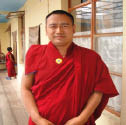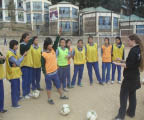 Self-immolation is ‘arguably one of the biggest expressions of oppression’ according to a spokesman of Kirti monastery in McLeod Ganj.
Self-immolation is ‘arguably one of the biggest expressions of oppression’ according to a spokesman of Kirti monastery in McLeod Ganj.
Kanyag Tsering, who spent nine years as a monk at Kirti’s sister monastery in Ngaba County in China’s Sichaun provence – the epicentre of the spate of self-immolations by Tibetans protesting Chinese oppression in their homeland – added that the 14 monks, nuns and layman were ‘compelled’ to set themselves alight, even if their actions temporarily exacerbate the current clampdown in ethnically Tibetan areas by Chinese security forces.
The ethics surrounding such actions have become a matter for debate among Tibet’s exiled population. Suicide is considered a grave sin according to the Tibetan Buddhist doctrine, which emphasises the preciousness of human life.
Speaking to the BBC last month, His Holiness the Dalai Lama praised the courage of those who attempted (at least six of whom succeeded) to lay down their lives for Tibet, but questioned the wisdom of making the ultimate sacrifice, asking ‘how much effect’ such actions are having.
But Kanyag Tsering, who maintains regular contact with monks at Kirti monastery in Tibet, says the worsening situation in Ngaba since Kirti became part of a chain of demonstrations protesting Beijing’s hosting of the 2008 Olympic Games, when dozens of Tibetans were killed and many more imprisoned, drove Phuntsok Jarutsang to set himself alight on March 16 – the third anniversary of the protests – and thirteen others to follow in his wake.
He said: ‘Since 2008 the oppression has increased and tens of thousands of Chinese soldiers have flooded into Ngaba. They have set up new garrisons and whenever there’s a festival or public gathering the town is flooded with Chinese military who intimidate the people. They have turned the town into something that looks more like a battlefield.
‘On March 16, most people mourn the deaths of those killed in 2008, and from March 10 this year the military started pouring into the county.
‘That’s why Phuntsok self-immolated. He was unable to bear the oppression.’
Eight of the 12 Tibetans who self-immolated in ethnically Tibetan areas of China were from Ngaba. Four were monks at Kirti monastery, whilst another three were former monks forced to disrobe after the Chinese authorities allegedly expelled over 1200 monks, before forcing a four month ‘political re-education’ programme on those remaining at the monastery. Tenzin Wangmo, a 20-year-old nun from the Mame Dechen Chokorling nunnery, two miles from Ngaba, also fatally self-immolated, whilst four more Tibetans set themselves alight in Kardze and Chamdo in Kham, three of whom are known to have died from their injuries. Another two survived self-immolation attempts in New Delhi and Kathmandu.
Asked if he expected the self-immolations to exacerbate the Chinese clampdown in Ngaba, Kanyag Tsering said: ‘It’s obvious that for the moment there’s going to be so much oppression.
‘But for the greater cause of Tibet (the self-immolations) are a big contribution because of the interest they have generated around the world.
‘They are the biggest expression of resentment towards the oppressive regime, and for Tibetans it’s very important to use all media to convey the message that’s coming out from Tibet, so all these lives don’t go to waste.’
Outside the monastery most exiled Tibetans seemed to share both his support for the self-immolators and his desire to spread the news of Tibet’s plight to an international forum.
President of the Tibetan Youth Congress, Tsewang Rigzin, said: ‘The Tibetan Youth Congress is deeply inspired by these ultimate sacrifices by our brothers and sisters.
‘Self-immolations and hunger strikes are the last resort of a non-violent movement, and non-violence is what the Tibetan struggle is all about.’
Asked if he considered such acts to be contrary to Buddhist doctrine, he said ‘It’s true that Buddhism says that taking a life, no matter whether it’s yours or anyone else’s, is a sin.
‘But these martyrs who have self-immolated have done it for the greater good of the six- million Tibetan people.’
Dhundup Tsering, 27, who works for the Central Tibetan Administration’s Department of Religion and Culture, said: ‘These immolations happened because people don’t have any human rights in Tibet. They don’t have any other choice.
‘Tibetans are now a minority in Tibet, and if they protest the Chinese authorities can easily put them in prison.
‘Some people say this kind of thing is violent. This thinking is totally wrong, because the self-immolators haven’t hurt other people. Whatever they are doing is for the sake of other people.
‘They burn themselves to raise their voices internationally.’
Tenzin Cheme, 26, who is in charge of the Tibet Museum, added: ‘It’s quite obvious that they (the self-immolators) are very desperate.
‘Most are monks and nuns, and this shows that they don’t have enough religious rights in Tibet.
‘Some people feel that talking about self-immolations – especially to the outside world – encourages people inside Tibet to do it, but rather than encouraging them to do these things, I think we’re spreading the message to the outside world that Tibet needs attention.
‘As far as sacrificing oneself for a bigger cause is concerned, it doesn’t count as a sin.’




 Print
Print Email
Email